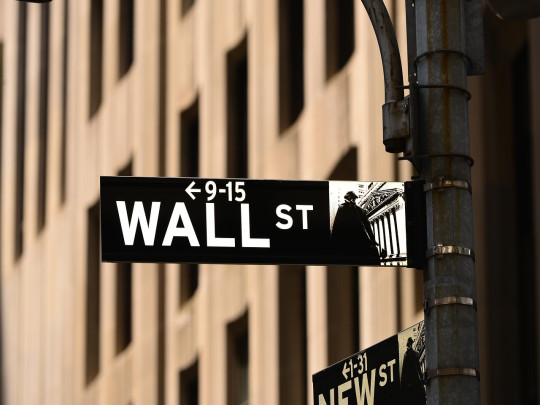Stock Market Update: S&P 500 Stalls Near Record Highs, FedEx Slumps, Coinbase and BlackBerry Rally
Stock Market Update: S&P 500 futures flat as investors await Powell's comments. FedEx drops after cautious outlook, while Coinbase jumps on bullish call. BlackBerry rallies post-earnings. Oil edges higher as ceasefire holds, QuantumScape soars on tech milestone.

- Early Wednesday US stock futures hovered near flat, with momentum from Tuesday's rally stalling as investors balanced optimism over the Israel-Iran ceasefire with a cautious outlook from FedEx and awaited more testimony from Fed Chair Jerome Powell.
- The market rallied strongly on Tuesday, driven by the US-brokered Israel-Iran ceasefire, which eased geopolitical tensions and sent oil prices lower, leaving the S&P 500 just 0.9% shy of its 52-week high.
- Tuesday saw a strong market rally (Dow +1.19%, S&P +1.11%), with the tech-heavy Nasdaq-100 closing at a new record high as the ceasefire news boosted risk appetite.
- Significant premarket movers Wednesday included QuantumScape (+35%) soaring on a manufacturing milestone. BlackBerry (+7%) jumped on a beat and raised guidance. FedEx (-5%) fell on a weak current-quarter earnings forecast. Coinbase (+3%) rose on a price target hike. Rubrik (+1%) is reportedly buying AI startup Predibase.
- The Israel-Iran ceasefire is tentatively holding despite mutual accusations of breaches. An initial US intelligence assessment reportedly found the weekend strikes did not fully destroy Iran's nuclear sites, a claim President Trump disputed.
- In testimony Tuesday, Fed Chair Powell reiterated a cautious "wait-and-see" approach on rates. In a major development, NATO members agreed to raise their defense spending target to 5% of GDP by 2035.
- Company news included FedEx issuing a weak earnings outlook, citing global demand and trade policy impacts. A federal judge handed a win to AI company Anthropic in a key copyright case. Tesla's European sales continued to decline in May (-27.9% YoY).
- Global markets Wednesday saw Europe open higher, led by a surge in defense stocks after NATO announced its new 5% spending target. Asia finished mixed.
- US Treasury yields were little changed Wednesday morning (10-year around 4.29%) as investors awaited Powell's second day of congressional testimony.
- Gold prices steadied Wednesday after falling on the ceasefire news. Oil prices edged higher, recovering some recent losses, supported by a drop in US crude inventories. Bitcoin posted modest gains.
- Market sentiment improved with the Mideast ceasefire but remains fragile. Investors are weighing the durability of the truce against economic headwinds and uncertainty over Fed policy.
S&P 500 futures hovered near flat on Wednesday as investors assessed whether the index could reclaim its record highs. Markets rallied on Tuesday, buoyed by optimism that the ceasefire between Israel and Iran would hold. The easing of geopolitical tensions helped drive oil prices lower for a second consecutive session, with crude settling down by 6%. That drop in energy costs provided a tailwind for equities, particularly sectors sensitive to input prices.
On Wednesday, however, momentum appeared to stall. U.S. stock futures were muted as investors balanced optimism over the Middle East truce with fresh commentary from Federal Reserve Chair Jerome Powell. His remarks, expected later in the day, could influence expectations for the timing and extent of interest rate cuts. While the conflict-driven risk premium in oil eased earlier in the week, prices began edging back up, though they remain near multi-week lows, reflecting the fragile calm in the region.
Meanwhile, broader economic concerns resurfaced. Delivery giant FedEx issued a cautious financial outlook, citing persistent demand uncertainty and macroeconomic headwinds. The company’s commentary underscored the uneven recovery across industries and contributed to a more subdued tone across markets.
US Market Previous Day:
The major U.S. stock indexes rallied on Tuesday as a ceasefire between Israel and Iran boosted investor confidence and risk appetite. The Dow Jones Industrial Average surged 507.24 points, or 1.19%, to close at 43,089.02. The S&P 500 climbed 1.11% to finish at 6,092.18, leaving it just 0.9% shy of its 52-week high. The Nasdaq Composite gained 1.43% and ended the session at 19,912.53.
Tech-heavy indexes saw particularly strong gains. The Nasdaq-100 rose 1.53% to close at a record high of 22,190.52, reflecting strength in large-cap technology and growth names. The strong performance across the board was driven in part by easing geopolitical tensions, as the ceasefire in the Middle East lowered energy market volatility and improved investor sentiment globally.
US Futures Remain Flat:
- Dow Jones Industrial Average futures remained flat with increase of 0.01%
- S&P 500 futures showed meagre gains of 0.13%
- Nasdaq Composite futures lead the pack with gains of 0.33%.
Biggest Premarket Movers
- Rubrik: Shares of the data management software vendor rose 1% after it agreed to buy the startup Predibase, a company specializing in the deployment of artificial intelligence models. According to a CNBC report, a person familiar with the transaction said Rubrik intends to pay as much as $500 million as part of the deal.
- BlackBerry: The cybersecurity stock popped 7% after its first-quarter revenue and profit both topped analyst estimates. BlackBerry also raised its full-year guidance for revenue and adjusted earnings before interest, taxes, depreciation, and amortization, signaling confidence in its performance for the remainder of the year.
- Coinbase: Shares rose about 3% on the back of a bullish investment opinion from Bernstein. Analyst Gautam Chhugani maintained an outperform rating on Coinbase and significantly lifted his price target by 65% to $200. Chhugani highlighted that Coinbase dominates the U.S. crypto trading market and has consistently defied bearish arguments from analysts.
- Yum Brands: Shares of the parent company of KFC, Taco Bell, and Pizza Hut rose more than 1% after JPMorgan upgraded the restaurant chain to "overweight" from "neutral." The bank cited strong free cash flow generation, among other catalysts, as a reason the shares could move higher.
- FedEx: The Memphis-based shipper dropped 5% after its earnings guidance for the current quarter came in weaker than expected. FedEx forecast adjusted earnings per share between $3.40 and $4.00, while analysts polled by FactSet had penciled in $4.05. This cautious outlook overshadowed the company's better-than-expected results for the fiscal fourth quarter that just ended.
- QuantumScape: Shares soared more than 35% after the startup, which develops solid-state lithium-metal battery technology, announced a major manufacturing milestone. QuantumScape has integrated its advanced "Cobra" separator process into its baseline cell production. In a press release, the company stated that Cobra is designed to enable faster and more energy-efficient production of its next-generation batteries.
Israel-Iran War Update:
The ceasefire between Israel and Iran, brokered by U.S. President Donald Trump and announced Monday, appears to be tentatively holding, though tensions remain high. On Tuesday, Israel confirmed it would abide by the ceasefire as long as Iran did the same. However, both sides accused each other of breaching the truce earlier in the day, raising concerns about its durability. Trump expressed his frustration, saying he was “not happy” with either party as accusations flew.
Meanwhile, an initial U.S. intelligence assessment indicated that the weekend strikes on Iran’s nuclear sites did not fully destroy the targeted facilities. Three sources familiar with the findings told NBC News that critical components of Iran’s nuclear infrastructure remain intact, casting doubt on the effectiveness of the U.S. operation. One source described this as “a bad sign for the overall program.” President Trump disputed the report in a post on Truth Social, insisting the facilities were “COMPLETELY DESTROYED” and later reiterated that claim to reporters in the Netherlands, though he acknowledged that the intelligence assessment was still “inconclusive.”
Key Economic Data/News:
Federal Reserve Chair Jerome Powell returned to Capitol Hill on Wednesday for a second day of testimony, this time before the Senate Banking Committee. On Tuesday, he told the House Financial Services Committee that the Fed is likely to remain on pause while officials assess the inflationary impact of President Trump’s new tariffs. Powell emphasized that the full effects of the tariffs depend on their eventual scale and scope. Trump again lashed out at Powell in a Truth Social post, calling him “very dumb” and claiming interest rates should be at least two to three points lower. Powell dismissed the criticism, stating, “We’re doing our jobs,” and reiterated that political pressure would not influence the Fed’s decisions.
In a major development at the NATO summit, member nations agreed to dramatically increase their defense spending targets. In a joint declaration released Thursday, NATO committed to raising the target from 2% to 5% of gross domestic product by 2035. The alliance described the decision as essential in the face of mounting global security threats, particularly from Russia and ongoing terrorism risks. The declaration underscored the need for a collective investment in defense to uphold NATO’s obligations and strategic credibility.
Earnings Season / Company News:
Tesla’s European sales continued their downward trend for a fifth straight month in May, according to figures released Wednesday by the European Automobile Manufacturers Association (ACEA). Across the European Union, the U.K., and the European Free Trade Association, Tesla sold 13,863 vehicles last month — a 27.9% decline from the same period last year. The slump underscores the competitive pressure Tesla is facing in key international markets. Despite the data, shares of Tesla were marginally higher in premarket trading.
FedEx shares fell in after-hours trading following a weak earnings outlook that missed analyst expectations. The logistics giant projected adjusted earnings for the current quarter between $3.40 and $4.00 per share, below Wall Street estimates of $4.06, according to LSEG data cited by Reuters. CEO Raj Subramaniam described the global demand environment as “volatile” and pointed to the negative impact of President Trump’s trade measures — particularly the removal of duty-free status for inexpensive shipments from China-linked e-commerce platforms such as Shein and Temu. The company refrained from providing full-year earnings and revenue guidance, citing the uncertain economic environment. FedEx’s results, often seen as a bellwether for global trade and economic momentum, suggest growing caution among businesses amid geopolitical and trade headwinds.
In the legal and technology sector, a federal judge delivered a significant win for artificial intelligence companies by ruling that Anthropic did not violate copyright laws by using books to train its AI model, Claude. The judge determined that the AI’s outputs did not reproduce specific creative elements or the unique expressive styles of any single author. The decision marks a potential turning point for the broader AI industry, which has faced mounting legal challenges from content creators and rights holders. The ruling may help shape future case law on fair use and data usage in AI training. Meanwhile, other companies like Midjourney continue to face lawsuits from major studios such as Disney and Universal over alleged IP misuse.
In the consumer space, McDonald’s and Krispy Kreme are ending their partnership, which brought the doughnut maker’s products to 2,400 McDonald’s locations. Starting next week, Krispy Kreme doughnuts will no longer be available at the fast-food giant. The companies said the deal ultimately failed to meet profitability expectations. Krispy Kreme CEO Josh Charlesworth cited an inability to align costs with unit-level demand as the primary reason for terminating the initiative. The move follows a suspension of the program in May and the doughnut chain’s earlier withdrawal of its full-year financial guidance.
Global Market Trends:
European markets traded higher on Wednesday, buoyed by defense sector gains and optimism surrounding the NATO summit in The Hague. The pan-European Stoxx 600 index rose around 0.3%, with most major bourses in the green. France’s CAC 40 was up 0.4%, London’s FTSE 100 gained 0.2%, and Germany’s DAX hovered around flat. European defense stocks rallied sharply, with the Stoxx Aerospace and Defense index last seen up 1.2%. The surge comes as NATO leaders, with the exception of Spain, agreed to raise their defense spending target to 5% of GDP by 2035 — a significant increase and a bullish development for the region’s military contractors. The defense index has now gained nearly 50% year-to-date.
In Asia, market sentiment was more mixed as investors assessed the tentative ceasefire between Israel and Iran, as well as fresh commentary from the Federal Reserve. Optimism is growing that the truce brokered by U.S. President Donald Trump will hold, easing concerns over a wider Middle East conflict. Japan’s Nikkei 225 rose 0.39% to close at 38,942.07, while the broader Topix ended flat at 2,782.24. South Korea’s Kospi advanced 0.15% to 3,108.25, while the small-cap Kosdaq fell 0.34% to 798.21. Hong Kong’s Hang Seng Index climbed 1.22% to close at 24,471.02 and China’s CSI 300 gained 1.44% to finish at 3,960.07. Australia’s S&P/ASX 200 was unchanged at 8,559.2.
Debt Market:
U.S. Treasury yields were little changed midweek as market participants kept a close watch on geopolitical developments and awaited further cues from the Federal Reserve. The 10-year Treasury yield held steady at 4.294%, while the 2-year yield edged slightly higher to 3.791%. The 30-year yield was also mostly flat at 4.837%. Investors are eyeing Fed Chair Jerome Powell’s second day of congressional testimony for any fresh guidance on interest rate policy. On Tuesday, Powell reaffirmed the central bank’s cautious approach, saying the Fed would remain on hold as it assesses the inflationary impact of President Trump’s new tariff regime.
Commodities and Other Assets:
Gold steadied on Wednesday, finding support after falling in the previous session as risk appetite improved amid signs that the truce between Israel and Iran was holding. The easing of geopolitical tensions reduced the immediate demand for safe-haven assets, prompting a retreat in gold prices on Tuesday. Still, underlying uncertainty over the long-term implications of the U.S. strikes on Iran’s nuclear infrastructure — and the potential for renewed instability — continues to support investor interest in maintaining some exposure to gold.
Oil prices edged higher on Wednesday, partially recovering from losses earlier in the week. Traders reassessed the durability of the ceasefire between Israel and Iran, and found additional support from signs of resilient U.S. demand. According to the American Petroleum Institute, U.S. crude inventories declined by 4.23 million barrels in the week ending June 20. The data helped offset some of the concerns that recent trade and geopolitical shocks might dampen energy demand. Oil had previously surged to five-month highs following the U.S. airstrikes on Iran’s nuclear facilities, but those gains moderated as fears of a broader regional conflict began to fade.
Bitcoin posted modest gains on Wednesday, extending its recovery from weekend losses as traders reacted positively to the apparent stability of the U.S.-brokered ceasefire. However, momentum in the broader cryptocurrency market showed signs of fading, with many altcoins under pressure from profit-taking. Bitcoin remained rangebound between $103,000 and $108,000, a level it has largely maintained throughout June. Despite the fragile geopolitical environment, the lack of fresh catalysts and uncertainty about how long the ceasefire will last kept crypto gains in check.
Market Sentiment:
The Israel-Iran conflict represents yet another geopolitical hurdle that markets have largely brushed off in 2024. Despite elevated tensions and direct military involvement by the United States, equities have shown resilience. Traders remain hopeful that the fragile ceasefire, brokered and announced by President Donald Trump, will continue to hold, limiting the risk of a wider regional conflict.
Markets have also looked past other looming risks, including concerns about renewed inflation tied to tariffs and questions about the durability of consumer spending. The broader U.S. stock market has repeatedly bounced back from pullbacks in recent months, buoyed by optimism around economic data and the strength of key sectors such as technology.
On Tuesday, the Nasdaq-100 closed at a new record high, while the S&P 500 and Nasdaq Composite moved to within close range of their respective peaks. As of the latest session, the S&P 500 sits less than 1% below its record, while the Nasdaq Composite trails by just 1.5%.
There is also growing attention on subtle dovish shifts from Federal Reserve officials. Although Chair Jerome Powell reiterated a cautious, data-dependent stance in his congressional testimony, markets interpreted his remarks as opening the door to possible rate cuts later this year.
Still, investors are treading carefully ahead of early July, when a temporary pause on new U.S. “reciprocal” tariffs is set to expire. The White House is working to strike agreements with dozens of trade partners to avoid a broad-based tariff wave that could disrupt global supply chains and potentially weigh on inflation and growth.



